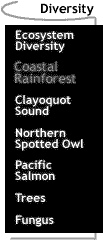 Left: Columbia black tail deer near treeline in Olympic National Park,
Washington. Photo: Ed Shay
Left: Columbia black tail deer near treeline in Olympic National Park,
Washington. Photo: Ed Shay
The Pacific Northwest is extremely rich in vertebrates because of its mountains,
its weather, and its forests. The terrain is rugged, and relief is generally perpendicular
to prevailing weather systems, As a result, annual precipitation ranges widely from
Windward to leeward areas. Vegetation responds to the range in moisture and shows
remarkable diversity ...
These forests include some of the largest, most long-lived trees anywhere (Norse 1990).
The remarkable biomass accumulated in these forests - 500 to 2000 metric tons per hectare
(Fujimori 1971; Franklin & Waring 1980) - exceed those of
tropical rain forests and contribute to their great economic value. (Bunnell, & Chan-McLeod, 1997, p.
104). "Granted with permission from The Rain Forests of Home, P.K. Schoonmaker,
B. von Hagen, and E.C. Wolf, © Ecotrust, 1997. Published by Island Press, Washington DC
and Covelo, CA. For more information, contact Island Press directly at 1-800-828-1302,
info@islandpress.org (E-mail), or www.islandpress.org (Website)."
Because of its mild climate, the coastal temperate rain forest retains much of its
richness all year. Although some species migrate, many others move into the area and its
associated waters during winter. Others migrate from breeding habitats in the mountain
hemlock zone to winter in the rain forest. In other instances, wintering and breeding
habitats differ but both are found within the area.
Excluding very rare occurrences and accidentals, 380 vertebrate species occur in the
narrow band of coastal temperate rain forest in the Pacific Northwest. Not all species, as
noted, are forest dwelling; the list includes those using lakes, estuaries, and rocky
islets. Nearly 69 percent (262) of the total are birds. Bunnell, & Chan-McLeod, 1997, pp. 106-107). "Granted with permission from The Rain Forests of Home, P.K.
Schoonmaker, B. von Hagen, and E.C. Wolf, © Ecotrust, 1997. Published by Island Press,
Washington DC and Covelo, CA. For more information, contact Island Press directly at
1-800-828-1302, info@islandpress.org (E-mail), or www.islandpress.org (Website)."



